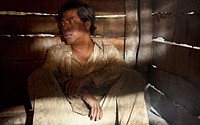
prd Maggie Renzi
with Joel Torre, Garret Dillahunt, Chris Cooper, Yul Vazquez, Rio Locsin, Dane DeHaan, Lucas Neff, DJ Qualls, Ronnie Lazaro, John Arcilla, Irma Adlawan, Art Acuna
release UK Oct.10 lff, US 19.Aug.11
10/Philippines 2h08

But I'm your friend: Torre



TORONTO FILM FEST

 Sayles continues his immersive filmmaking by travelling to the Philippines and making a historical drama that takes the style of a Filipino movie. This might be off-putting for Western audiences, but the story is genuinely gripping.
Sayles continues his immersive filmmaking by travelling to the Philippines and making a historical drama that takes the style of a Filipino movie. This might be off-putting for Western audiences, but the story is genuinely gripping.
In a tiny village in 1900, the occupying American army doesn't seem much more welcome than the previous Spaniards. The head of the village is Rafael (Torre), and he's caught precariously between his brother (Lazaro), who runs the local rebel militia, and the Yankee lieutenant (Dillahunt). Meanwhile, the local Spanish priest (Vazquez) is stirring the pot with his self-serving translating, while the regional American commander (Cooper) is getting fed up with the fact that the rebels are still on the prowl. Forget about winning hearts and minds, he wants control.
Not only is this a largely ignored chapter in American imperialist history, but it has stunning parallels throughout the past century, from Vietnam to Iraq, in the way the USA treats people they try to subdue in the name of their own national interests. Sayles based this film on exhausting research, so the depiction of waterboarding here is accurate, as are the occupiers' feeble attempts to install an awkward democracy for people who have run things quite fairly for generations.
In fact, the material is so strong that we wish Sayles had made it with Western viewers in mind. Instead, the film has that over-lit quality familiar in Bollywood movies, in which everything seems staged on freshly built sets with an immaculately made-up cast (even when they should look rough) dressed in newly sewn costumes. And the dialog often seems stilted and obvious, as if they're about to break out in song.
As a Filipino film, this might be an A-list blockbuster, but for European or American moviegoers it often feels simplistic and cheesy. The American soldiers are all stereotypes (Qualls' goofy techie, DeHaan's lovelorn dreamboat and so on), and the villagers are just as schematic, with good guys and bad guys and not a shade of grey among them, even if not everyone knows who's whom. But by cracking the door on an unspoken segment of US history, Sayles makes it clear that there are a lot of stories here that need to be told.
 |
themes, violence, some language | 15.Oct.10 lff |

 Still waiting for your comments ... don't be shy.
Still waiting for your comments ... don't be shy.
HOME | REVIEWS | NEWS | FESTIVAL | AWARDS | Q&A | ABOUT | TALKBACK